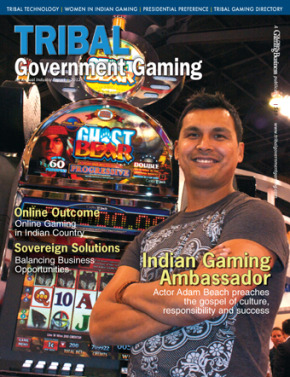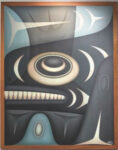
Anyone who has been to Indian Gaming, the annual trade show and conference of the National Indian Gaming Association, will be familiar with Adam Beach. When he first started showing up at the NIGA show, Beach was a relatively obscure actor drawing on his Native American heritage to build his reputation in Hollywood. Over the years, his profile began to expand, as he landed roles playing strong Indian characters in movies and television shows such as The Rez, Walker Texas Ranger, Windtalkers, Coyote Waits and many more.
Beach first connected with a wide audience in 1998 when he played a troubled Spokane youth in the critically acclaimed movie Smoke Signals. The role made him a cult figure among Native American tribes, and other impressive roles followed, including a leading part in director John Woo’s World War II epic Windtalkers, for which Beach spent six months learning the Navajo language. He went on to star in Skinwalkers (2002), an adaptation of the popular Tony Hillerman book—he would reprise his role twice as Officer Jim Chee in the PBS mystery series.
But Beach’s mainstream breakthrough came in 2006, playing Ira Hayes in Clint Eastwood’s Flags of our Fathers. As one of the six Marines to raise the American flag on Iwo Jima, the role showcased the actor’s emotional depth and earned him two Best Supporting Actor Award nominations. His role as Charles Eastman, the Sioux doctor, author and advocate, in the HBO mini-series Bury My Heart at Wounded Knee came a year later, broadening Beach’s appeal and garnering him a Golden Globe nomination.
By the time he was awarded a key role in the long-running TV series Law and Order in 2008, Beach was considered a crossover performer with more than 60 appearances on both the big and small screen.
Just last year, Beach starred with Harrison Ford and Daniel Craig in the hit movie Cowboys and Aliens, where, ironically, he played a cowboy.
A citizen of the Dog Creek First Nation in Manitoba, Canada, Beach has also been long involved in Canadian film and television productions. He produced and starred in the independent film Older Than America, and played the lead in the aboriginal sitcom Moose TV. His latest venture is Arctic Ice, a Canadian TV series about saving lives above the Arctic Circle.
Gaming Guy
Pursuing his interest in Native American affairs, Beach has become an advocate for Indian gaming. It’s a subject he is passionate about, as he has witnessed the positive effects of casino revenue on local communities. While he’s reluctant to call it the “new buffalo,” Beach recognizes what gaming has done for many tribes across the U.S. and Canada.
“So much progress has been made in Native American communities across North America because of Indian gaming,” he says. “But like all enterprises, you must have some business acumen to make it work.”
Beach speaks from experience. His home province, the First Nations of Manitoba, lacked casino industry expertise and lost out on an early opportunity.
“In Manitoba, two licenses were put up for bid,” Beach explains. “My tribe wasn’t involved, but we would have shared in the revenues.”
The managers of the casinos were chosen from politically connected groups in Manitoba, and a contract was signed that favored those groups instead of the tribes. Today, the casinos’ profits have not gone to the tribes, but to the managers.
“They should have found a tribal partner from the States,” he says. “Maybe a tribe that had already operated successful casinos. All they knew was Manitoba and Winnipeg. They don’t know that there’s anything else outside of there. They’re so hungry that they’ll sell themselves short.”
Beach, who hopes to one day be elected to a leadership role in the Lake Manitoba First Nation, emphasizes the need for education and informed business decisions in today’s competitive casino market. He celebrates tribes that can contribute to their communities via gaming, without losing sight of their heritage.
“That relationship of culture and business is important for a tribal casino,” he says. “The downfall of every successful business is greed and failed leadership. When you’re running a company that involves tribal gaming, you have to consider the health of your tribal community. That’s what determines the success of any tribal business. The most successful and independent tribal gaming operations are the ones that can balance their culture with the economic growth of the tribe. You can really see the value in those areas.”
Beach says tribes that remain true to their culture will be rewarded with more than just money.
“No matter how much you move forward with finances and wealth, you can’t forget who you are, and that’s the cultural component,” he says. “It provides balance for people and for tribes. We have a responsibility to our ancestors.”
Technology & IDENTITY
As a fixture at the NIGA trade show, Beach was approached by slot manufacturer Cadillac Jack to help design a slot machine that would recognize and honor Native culture. Working closely with Cadillac Jack designers and engineers, the company released “Ghost Bear,” which has become a leading earner in several Native American jurisdictions.
“Ghost Bear speaks about culture,” says Beach. “This game wasn’t designed for my benefit. I wanted to work with Cadillac Jack to create a game that represents Indian Country. People are tapping into their cultural identity. Like in Native media, where we don’t have to depend on Hollywood to determine who we are as Native peoples, tribal gaming can use culture to expand the technology and their identities.”
Beach says he wants to spread the new technology in Indian Country, as well, to encourage more participation from the tribal members.
“The technology is changing so fast,” he says. “The new platforms are changing the conventional slot machine, and much of that started in Indian Country. It’s like the start of a new generation.”
Life imitated art when Beach was chosen to play a casino manager of a tribal gaming establishment in the HBO series Big Love. He says he didn’t have to do much research for that role, and wanted to bring a sense of reality to the set.
“I wanted to add a little flavor to the idea of an outside entity trying to control a sovereign entity,” he says. “Indian gaming has been around for more than 20 years now, and was controlled for a long time by corporate America, which would issue mandates about how things should be run. Now that the tribes understand their sovereign rights, they are moving forward in a tradition sense of tribal leadership.”
Dedication to Culture
Beach has become an inspiration to many Native Americans, particularly the younger generation. He is asked to speak to youth groups all the time, and he encourages them to think for themselves when deciding what path to take. He points to his own youth, when he lost both parents in the space of a few months at age 8, and he and his two brothers were sent to live with their grandparents.
“I didn’t have a mother or father who was determining my life path,” he explains. “No one told me you are going to become a doctor or lawyer. So I didn’t know any better when I wanted to become an actor. I just went for it. Also, I lost the most important things in my life, so I always felt, ‘What do I have to lose?’”
Beach has dedicated his life to erasing the stereotype perception of Native Americans as drunks or drug addicts, and keeps himself clean and sober to reinforce that message.
“In Hollywood, there are only a handful of us who are dedicated to changing the perspective on Indians,” he says. “For me, I want to be the one guy who is not going to fall and fail because he has a drug or alcohol problem, or who is just a jerk. I want to be the guy who is respected because that’s the way I walk.
“I want to be in the game all the time. I want to be the guy who gets the opportunity to play someone like Ira Hayes, or to play Cowboys and Aliens as a cowboy. I want to use that fame to be able to talk to kids who have suicide issues. I actually did last month. One Native community had 200 suicide attempts in the last year, and they asked me to come in there to speak to them. That’s the value I have, and I’ll always maintain that responsibility and leadership.”
One of Beach’s most moving experiences in his career was to portray the legendary Eastman in Bury My Heart at Wounded Knee. He describes an incident on the set that truly changed his art—and his life.
“When we were shooting the film, I was working with Eddie Spears, one of the actors who actually came from the Pine Ridge Reservation where we were shooting,” he explains. “We were doing a scene where one of his daughters was dying and he was crying. But when they called ‘cut,’ he couldn’t stop crying. He had to step outside. I went after him and asked what was wrong. He told me that all he was seeing were ghosts. ‘Adam,’ he told me, ‘this is where I’m from. The girl in the bed could be my great grandmother. I’m playing someone who could be directly related to me. All I’m seeing is ghosts, and it scared me.’ From that point on, I could see them too. And I still see them.”










